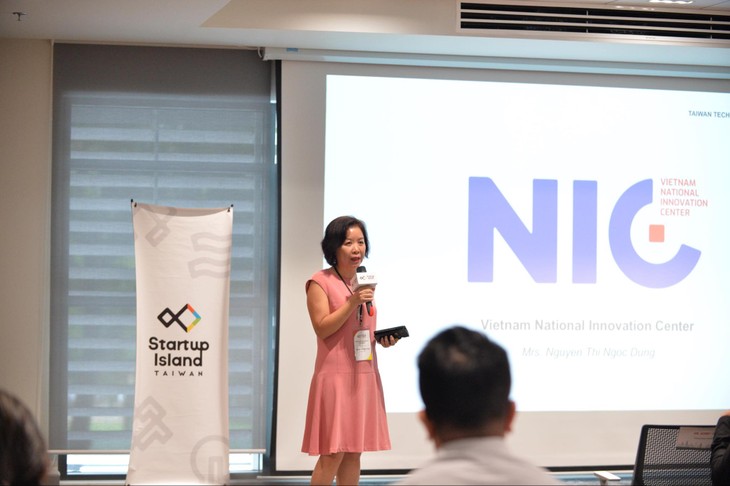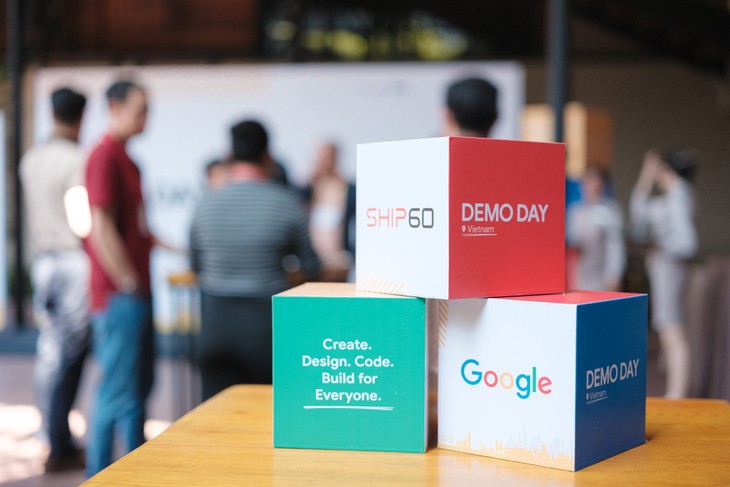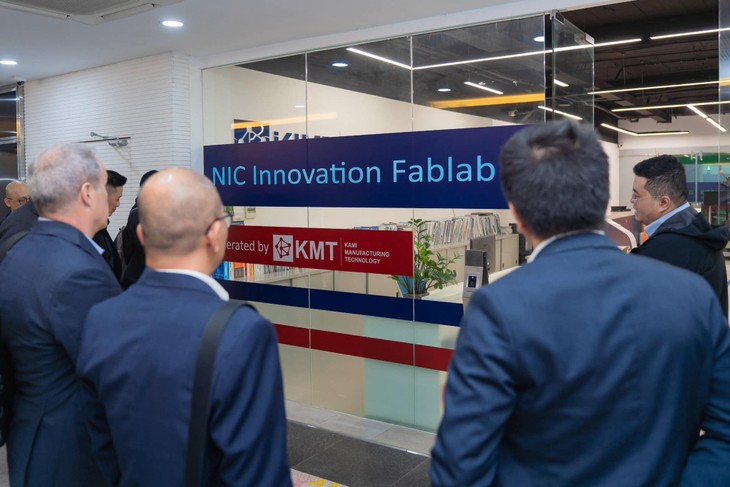(VOVWORLD) - 2023 saw new milestones in Vietnamese innovation, which moved Vietnam up 2 places to 46 of 132 countries and territories in the World Intellectual Property Organization’s 2023 Global Innovation Index. Vietnam’s National Innovation Center (NIC) played a key role in the achievements. What will NIC do in 2024 to sustain last year’s achievements? To find out, VOV24/7 talked to Nguyen Ngoc Dung, Senior Expert for NIC’s Entrepreneurship-Innovation Ecosystem. Ms. Dung, an advisor and mentor for Silicon Valley startups, spent 7 years working for the Office for Science and Technology at Vietnam’s General Consulate in San Francisco.
 Ms. Nguyen Thi Ngoc Dung, NIC’s senior expert in research and development, speaks at the Taiwan Tech Solution Day in Ho Chi Minh City, August 23, 2023. (Photo: Startup Island Taiwan) Ms. Nguyen Thi Ngoc Dung, NIC’s senior expert in research and development, speaks at the Taiwan Tech Solution Day in Ho Chi Minh City, August 23, 2023. (Photo: Startup Island Taiwan)
|
Bao Tram: Thank you, Ms. Ngoc Dung, for granting VOV24/7 this interview. 2023 was a busy year for the National Innovation Center. What do you think of the center’s achievements last year?
Ngoc Dung: In 2003 NIC did a lot of things. NIC is the core of the national innovation ecosystem, linking together all the elements needed to create opportunities for technology innovators, turn ideas into products, and commercialize those products on the largest possible scale.
NIC has gathered innovators from universities and research institutes and got them to participate in Vietnam’s innovation ecosystem. Last year NIC carried out programs to develop the network, which now has approximately 22,000 scientists and technologists with master's degrees or higher. NIC also held competitions to encourage creative people to develop new business models and new technologies.
 At Demo Day - the last milestone of 2023 Google for Startups Accelerator, SEA Vietnam - in Hanoi (Photo credit: NIC) At Demo Day - the last milestone of 2023 Google for Startups Accelerator, SEA Vietnam - in Hanoi (Photo credit: NIC) |
Bao Tram: What difficulties did NIC have to address?
Ngoc Dung: There were many difficulties, because Vietnam lacks many things needed for startups and innovation. For example, we lack labs and venture capital. Domestic venture capital hasn’t got an investment culture like the one in Silicon Valley. NIC itself is an unprecedented model in Vietnam. NIC wants to be an incubator of new technologies like the incubators in Silicon Valley. Startups will have to register business line which don’t yet exist in the business lines of the Ministry of Planning and Investment. They create completely new things. What NIC desperately needs is a freer framework for incubation and for NIC members to innovate. In China, the UK, the US, the Netherlands, and France, which have successful incubator models, investment in innovation is extremely profitable.
Bao Tram: In 2024 what will NIC do to overcome these challenges?
Ngoc Dung: There are a number of things it can do. Decree 94 specifies preferential policies for NIC. We are amending the Decree so that NIC has a special mechanism, a sandbox, for easy operation. Nearby Asian countries like Singapore, Thailand, and China have been very successful in operating innovation centers to create startup companies. These innovation centers have created successful unicorn companies that changed their economy. We will revise Decree 38, which defines startups and venture capital and allows the government to invest in startups. We hope the draft Capital Law, which is being revised to support the development of innovation and startups, will soon be approved. In that case, NIC will benefit from the Law to promote innovation in Hanoi. Once the new law is promulgated, NIC will have a legal corridor to support the national startup ecosystem.
 (Photo credit: NIC) (Photo credit: NIC) |
Bao Tram: Does NIC have any specific plans for supporting startup businesses this year?
Ngoc Dung: In addition to the annual startup support programs that we are doing in cooperation with Google, NIC is looking for established incubators to partner with. This year, NIC will give priority to incubating cybersecurity technologies and AI. Also high on NIC’s agenda is implementing a project to train 50,000 engineers for Vietnam's semiconductor industry. We hope that in our annual Vietnam Innovation Challenge, which will also focus on semiconductors and AI, will generate ideas which can be refined in NIC's incubators to create tools to support Vietnam’s semiconductor training. NIC has asked Vietnamese experts in the innovation network to become advisors to MPI or NIC or to mentor startups in our incubation program.
Bao Tram: You just mentioned AI as one of NIC’s priorities in 2024. What will NIC do to help AI and Generative AI companies?
Ngoc Dung: Generative AI is a very new industry. The first thing we must do is connect with Vietnamese experts abroad who are working in AI and Generative AI. We have been organizing conferences where they can present their views of development trends and let domestic businesses know what the development trends are. Second, the Vietnam Innovation Challenge will encourage people to register new ideas in AI. Third, NIC has a project to build an AI lab in Hoa Lac and is looking for partners. Once we have the lab, we’ll create training programs and incubation programs. The lab should be completed sometime this year.
Bao Tram: How about training 50,000 engineers for the semiconductor sector?
Ngoc Dung: NIC has been assigned to outline and oversee this project. NIC has two partners, Synopsys and Cadence Design Systems, who have built labs in Hoa Lac. Synopsys, an American technology corporation, has given NIC 300 licenses for students to use the Synopsys software to design chips. Synopsys's training program is aimed at universities with semiconductor majors, or majors related to semiconductors. NIC is seeking technology companies to partner with Synopsys so they can expand the number of licensed users beyond 300.
Bao Tram: Thank you, Ms. Dung, for this interesting discussion. We hope NIC’s plans to help Vietnam’s startup community this year will be fruitful.
Ngoc Dung: Thank you, VOV, for having me on the show!